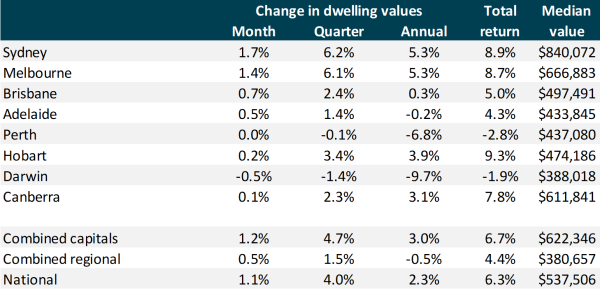Australia's housing market is starting the new decade off of a positive end to 2019, with dwelling values growing by 1.1% monthly and 4% quarterly, according to the latest figures from CoreLogic.
During the final quarter of 2019, the housing market recorded its fastest rate of price growth over any three-month periods since November 2009.
Looking at the monthly price gain, however, the result was softer relative to the growth recorded in November and October.
"This would suggest that the pace of capital gains may have been dampened by higher advertised stock levels or worsening affordability pressures through early summer," said Tim Lawless, CoreLogic head of research.
On an annual basis, dwelling values grew by 2.3%, with five of the eight capital cities and five of the seven 'rest-of-state' regions reporting gains.
Sydney and Melbourne registered the biggest gains, both hitting a 5.3% growth in dwelling values over the year. On the other hand, Darwin witnessed the steepest fall in prices at 9.7%.
The table below shows the changes in dwelling values in each capital city.

Lawless said the positive year-end results mask what has been a year of two distinct halves.
"We saw capital city dwelling values fall by 3.8% over the first six months of 2019 and then rebound by 7.0% over the second half of the year," he said.
The rebound in the second half of the year was due to several factors, including lower mortgage rates, the relaxation of borrower serviceability assessments, improved affordability, and renewed certainty around property taxation policies after the federal election.
Lawless said the lower advertised housing supply could provide further momentum for the prices as buyer activity remains strong.
In the regional areas, the story is a bit different. Despite the strong rebound during the second half of 2019, property values across most regions are still below their previous record highs.
Lawless said if the current quarterly rate of growth persists into 2020, the national housing market will record a "nominal recovery" in March as dwelling values push to new record highs.
"A nominal recovery in housing values implies homeowners are becoming wealthier, which may also help to support household spending. However, the flip side is that housing affordability is set to deteriorate even further as dwelling values outpace growth in household incomes, signalling a set-back for those saving for a deposit," he said.